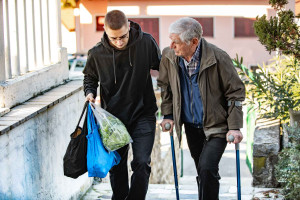The past few years have raised some hard questions about the science of well-being. How culturally biased is our conception of happiness? How much do social forces (or genetics) shape happiness, compared to our own efforts? Is there a limit to our compassion and empathy?
Some studies we’ve chosen to highlight from the past year tackle these questions directly, suggesting where the research might go in the future. Other insights reinforce the importance of caring for each other, especially in these difficult times: For example, being kind helps your own mental health, caring workplaces are productive ones, and grateful parents have better relationships with kids.
The final insights were selected by experts on our staff, after soliciting nominations from our network of nearly 400 researchers. We hope they can help you to strengthen your relationships as we head into 2024.
World happiness rankings need to take culture into account

Hundreds of thousands of people all over the world regularly fill out surveys meant to measure happiness in life. And every year, one major finding from these studies is the World Happiness Report, including a ranking of nations by happiness scores—leaving many to ponder: Should we move to Denmark?
A study published this year in the Journal of Happiness Studies suggests, however, that these rankings may be biased. Why? Because people from different cultures interpret the survey questions and think about what the word happiness means in different ways, based on cultural ideals.
In their study, a large team of 65 scholars devised a culturally sensitive approach to measuring happiness, administered it to 13,000 people around the world, and compared these scores to scores obtained using the typical approach. They took culture into account by asking people not just about their own happiness, but also about the happiness of their family and those around them; additionally, they asked what happiness would look like for the “ideal” person in their culture.
Compared to the typical approach, which asks only about how happy you are in your life, average happiness scores from the culturally sensitive approach were higher in countries that put greater value on interdependence, harmony, and relationships. In other words, the typical approach to measuring happiness may land more collectivist countries lower in the ranks than they should be.
Why does this matter? If we want to help people be happier, and figure out what in our societies is contributing to happiness (like education, green space, more equitable income, and more), we need to be measuring happiness the right way—and reflecting the life experiences of all kinds of people.
While this work highlights how important culture is in measuring happiness, there are likely other cultural ideals and worldviews that shape how people think about happiness, as well as other approaches to measuring happiness that should inspire continued research.
We’re on the brink of much stronger research into happiness practices

Starting in 2010, a series of studies pointed to a replication crisis in psychology: Too often, when researchers redid experiments using the same procedures and samples as peer-reviewed studies, they weren’t getting the same results.
One of the reforms that came out of this crisis is pre-registration, which asks researchers to publicly state their statistical analysis plans before starting experiments. This discourages them from changing their methods in response to what they see in the data (a practice called “p-hacking”), which they might be tempted to do in order to get significant results that would be more likely to be published. Researchers are also being asked to recruit more participants: In almost all social science studies, the larger the pool, the more statistically valid the results.
Did steps like those help improve the research? In a paper published in the journal Nature Human Behaviour, University of British Columbia professor Elizabeth Dunn and graduate student Dunigan Folk reviewed 532 studies of five core practices for a happier life: gratitude, social interaction, exercise, mindfulness, and experiencing nature.
Of those studies, only 57 were pre-registered and had enough participants for authoritative results. Dunn and Folk zeroed in on that group to assess their results. Only four of those, they found, had sufficient statistical power to support robust conclusions: two validated gratitude practices and two found social connection boosted happiness. The rest of the results on mindfulness, exercise, and time in nature were much more mixed. (Note that many of the group of 532 studies had been published before the replication crisis and the subsequent reforms; Dunn and Folk chose to focus on the studies they deemed strongest.)
In a followup paper published in the Annual Review of Psychology, Dunn and Folk extended their findings to discover many of these practices seem to work best in combination with each other, according to the studies they reviewed. Alongside that, they found a different pathway to well-being that does have strong evidence behind it: “Governments and organizations can improve happiness by providing underprivileged individuals with financial support.” In fact, research with extremely large numbers of participants in economics and sociology suggest that changes in domains like the law, the economy, and education can have a major impact on our well-being.
Does that mean you shouldn’t embrace these individual-level practices? As Dunn and Folk emphasize, absolutely not. The point of their work isn’t that people shouldn’t meditate or hike or exercise; it’s that science is still trying to understand why and how and when they do work for so many people.
That quest can only be helped by stronger research practices. As Dunn and Folk write, “Happiness research stands on the brink of an exciting new era, in which modern best practices will be applied to develop theoretically grounded strategies that can produce lasting gains in life satisfaction.”
We have the ability to become more intellectually humble

Can people cultivate humility? Until recently, the science has been rather vague on this question. But 2023 saw a wave of studies that suggest we can, in fact, cultivate humility. Specifically intellectual humility, which is simply the ability to admit that you might be mistaken.
In one study of over 500 middle school students across two academic years, researchers found that classrooms that emphasize effort and growth and normalize mistakes encourage the development of intellectual humility. In another study of high school students, young adults, and undergraduates, researchers discovered that classrooms oriented toward intellectual ability tended to stifle intellectual humility.
Beyond the classroom, a team at Wake Forest University developed an online course—one that emphasized setting goals, self-reflection, and practice in daily life—that helped people become more intellectually humble. Yet another study found that “self-transcendent” emotions—feelings like awe that take us beyond the self, that we experience by, for example, taking walks in nature—could do the same. A fourth paper published by Royal Society Open Science found that asking people to reflect on their own values led to more humility in a debate about university tuition fees.
From these studies, we can see some steps toward greater intellectual humility: focusing on effort and growth, learning the fundamentals of humility, experiencing awe and other self-transcendent emotions, and reflecting on our own values. If you’d like to think about improving your own sense of humility, start by taking our quiz.
People feeling anxious or depressed benefit from doing kind acts

Depression and anxiety are fairly rampant these days—made worse by COVID-19 and its aftereffects. So, it’s always good to know about evidence-based practices that can help alleviate symptoms.
To that end, a study published in The Journal of Positive Psychology this year suggests one: practicing random acts of kindness.
Researchers assigned people with moderate depressive or anxious symptoms to do one of three things across five weeks:
- Perform three random acts of kindness on two days of the week. These were “big or small acts that benefit others or make them happy, typically at some cost to yourself in terms of time or resources.”
- Plan a social activity on two days of the week.
- Complete a “thoughts record” for at least two days a week. Thoughts records involve identifying distressing or distorted thoughts and learning how to challenge and reframe them.
Afterward, those who’d practiced kind acts had similar results to those who did the other two traditionally recommended exercises—depression and anxiety symptoms went down. But there was an added benefit: They also felt more socially connected, while the others didn’t.
This could be due to how helping others decreases our self-focus in social situations, says researcher Jennifer Cheavens, while making us happier and increasing our sense of self-efficacy, too. Plus, kind behavior can bond us together. In fact, another study from 2023 found that adolescents who played a random acts of kindness game on an app felt more compassion and empathy for others and were less inclined toward physical aggression than adolescents who played a different game.
Still, this may be the first time that practicing kindness compared favorably to more traditional recommendations for depression and anxiety. This means it could be a powerful tool for improving mental health, while promoting more social connection—for all of us.
“The Surgeon General has been talking about the importance of belongingness and socially connecting to other people, and acts of kindness . . . may be a little less vulnerable than other ways we put ourselves out there,” says Cheavens.
Ghosting someone doesn’t just hurt them; it also hurts you

About 30% of people in the United States have experienced being “ghosted,” where a friend or potential romantic partner stopped communicating online unexpectedly and without explanation. Being ghosted causes hurt, confusion, and anger, affecting the well-being of the “ghostee” in significant ways.
But a study published in Telematics and Informatics this year found it’s not just the victim of ghosting who suffers. The ghoster also pays a price.
In the study, older teens and young adults reported how often they’d ghosted a friend, acquaintance, or partner from a casual or steady relationship. They also reported on their self-esteem and depressive symptoms, as well as how overwhelmed they were by social media and smartphone communications, initially and about four months later.
Findings showed that people who ghosted friends more were more depressed later, no matter how depressed they were at the outset. Researcher Michaela Forrai says this suggests ghosting affects our mental health, likely because it harms important relationships.
“Social connections are important for one’s well-being, and even limited, emotionally-intense relationships come with significant benefits—which we tend to underestimate,” says Forrai. “A lack of relatedness can put individuals at risk for depressive tendencies.”
Interestingly, ghosting romantic partners didn’t lead to depression in ghosters, perhaps because there are fewer expectations when relationships are new or exploratory. Also, people were more likely to ghost partners (but not friends) when they felt overwhelmed by others’ expectations for frequent communication—something that may be more common between partners than between friends.
This research has several implications for both ghoster and ghostee. Ghostees may want to check in before assuming the worst—particularly if they value the relationship. Sometimes, ghosters get too busy and forget a conversation thread, or they may feel guilty or embarrassed about their lapse and not know how to repair things.
On the other side, lots of research shows that warm social relationships—particularly friendships—are good for our well-being, while avoiding difficult emotions or conversations can keep folks at a distance. What seems like the easy way out may just end up backfiring on you.
We can feel less exhausted by helping others if we think about compassion differently

If it feels like there’s so much suffering in the world right now, that means there’s also so much need for compassion: our concern for and motivation to help with others’ suffering.
At the same time, though, many of us may be experiencing what researchers call compassion fatigue, where we become less compassionate as we witness more pain and struggle. But is there some way to counteract that?
In a 2023 study published in Psychological Science, researchers Izzy Gainsburg and Julia Lee Cunningham of the University of Michigan found that if we think about compassion a little differently, we might be able to alleviate our exhaustion.
Across two experiments, the researchers asked participants (mostly white) to listen to podcast episodes that talked about compassion in two different ways. For example, one said that “there are limits to people’s capacity to feel compassion . . . Ultimately, people will run out of compassion,” and that it’s exhausting and fatiguing. The other said, “People can feel unlimited amounts of compassion. . . . Ultimately, compassion can fuel itself.”
They found that people who learned that compassion was expansive felt more compassionate and showed less compassion fatigue when viewing distressing images, like illness and war or animals suffering—in some ways akin to what we might see in the news.
Other participants looked at LinkedIn posts ostensibly written by students seeking work, who had had job offers rescinded during the pandemic. The participants had the opportunity to show compassion by offering encouragement and advice about the posts, and indicated whether they would introduce the student to someone they knew. Ultimately, people who learned that compassion wasn’t limited offered more help and support.
This study isn’t meant to suggest that compassion fatigue isn’t real, or that it’s our fault because of our own misguided thinking. Instead, it suggests a possible practice that we can all try when we feel weighed down by the hardship around us. As the authors write, “People’s beliefs about the nature of emotions affect how emotions are experienced.”
It pays to care about each other at work

We’re in a riptide of going “back to normal” at work after the COVID-19 pandemic—but normal wasn’t necessarily so great. Before the winter of 2019, people were grappling with workaholism, snowballing disengagement, and burnout. Is there something we can do to pause and put our work lives back together in a better way?
A first step in this direction, according to a study published this year, is to focus on creating a caring workplace environment.
Dorota Weziak-Bialowolska and her colleagues at Harvard University analyzed responses to surveys, personnel files, and health insurance claims from over 1,200 employees of a large service company. They initially asked employees about the organization’s psychological climate of caring, captured by statements like: “People feel respected at work,” “Employees feel that they are treated fairly regardless of age, gender, or ethnicity,” “Employees trust senior leadership,” and “I feel recognized for my work.”
One year later, people who experienced more caring at work tended to be more productive and engaged at work, feel less distracted, and have higher well-being.
“The results suggest that working adults who perceive their workplace climate as caring have substantially lower odds of diagnosed depression, higher reports of overall well-being, as well as greater self-reports of mental health, physical health, social connectedness, and financial security,” the authors write.
While no single approach is likely to fit every organization’s post-pandemic efforts to reignite joy, ingenuity, vitality, and world-changing impact at work, this study highlights how important caring about each other will be. Attempting to build a culture of trust, fairness, interpersonal respect, and mutual appreciation is a good first step.
If you practice gratitude, your children can benefit, too

While parents are often on the lookout for new tips and tricks on what we can do for our children to help support their development, more research is pointing to how important it is to be receiving care for ourselves. In fact, nurturing our own well-being is key to helping our children flourish.
In a study published this year in Emotion, researchers Katherine Nelson-Coffey and John Coffey discovered one simple way we can do that: by practicing gratitude.
They found that parents tended to experience greater well-being—fewer negative emotions, and more positive and empathic emotions, life satisfaction, meaning in their lives, connectedness to others, and autonomy—on days when they felt more gratitude than usual, regardless of how happy they felt that day. What’s more, parents tended to feel greater closeness and less conflict with their children on those days, regardless of how challenging it was for them to care for their children that day.
What’s a simple way to feel more grateful? Just take 10 minutes to write a gratitude letter to someone who made you feel cherished or influenced your life. In a related experiment, the researchers found that parents who wrote a gratitude letter (compared to writing about their daily activities) tended to experience greater positive emotions immediately, and, in turn, had greater well-being one week later. After those seven days, they also felt closer to their child, felt more satisfied with their parenting, and experienced more positive child behaviors—and fewer challenging child behaviors.
These studies highlight that gratitude can help parents by “filling up our cups” with positive emotions, which can replenish our internal resources to allow us to be our best possible selves. When parents’ well-being is nurtured, our families can reap the benefits through a ripple effect.
And it doesn’t have to involve adding more to a long list of daily parenting dos and don’ts. For a lot of us, a simple gratitude practice at the end of the workday may be doable and effective in strengthening our own well-being and our family relationships.
Feeling awe might help kids be more generous

Childhood can bring a bounty of awe—the emotion triggered by something vast that challenges our understanding of the world and is sometimes described as wonder, amazement, surprise, or transcendence. For example, our children can feel awe looking up at a dark night sky filled with more stars than they’ve ever imagined, or through mind-expanding experiences with the arts, music, architecture, and other people.
A study published in Psychological Science this year by researcher Eftychia Stamkou and her colleagues found that awe doesn’t just open up children’s minds but can also make them kinder.
In an experiment, children watched videos evoking awe (from Song of the Sea), joy (Fantasia), or neutral emotions and then had the opportunity to support a food drive. Children who watched the awe-inspiring video spent more time counting food donations and donated their rewards to refugee families more often than children who watched the other videos. What’s more, the researchers found that the children who experienced awe had greater parasympathetic nervous system activity—a marker of calm social engagement—compared to children who experienced joy.
“Although children from an early age are more likely to help in-group than out-group members, our findings show that awe can open them up to helping members of a national minority,” explain Stamkou and her colleagues. In other words, awe-inspiring art has the power to spur children to be compassionate toward people experiencing hardship and exclusion.
This study offers us more reason to expose our children to awe, whether that’s through spectacular animated movies, city murals or folk art, music, or the architecture all around us.
People aren’t becoming more unethical, despite what you might think

When we read news reports of people’s bad behavior, it’s easy to think morality is in decline. But a new study published in Nature suggests this is an illusion, not based on any available evidence.
Researchers Adam Mastroianni and Daniel Gilbert analyzed surveys of Americans and others around the world (from the 1940s to 2019) on moral decline in society. They found that, no matter the time or place, people thought moral goodness was waning—a highly unlikely scenario. This belief seemed even more suspect when they surveyed people recently and found that they always found current morality wanting—whether in comparison to two years ago or to 20 or more years ago.
If morality were in steady decline, there should be evidence, figured the researchers. So, they also analyzed surveys where people reported on their own and others’ kind, helpful behavior, answering questions like, “Would you say that most of the time people try to be helpful, or that they are mostly just looking out for themselves?” and “During the past 12 months, how often have you carried a stranger’s belongings, like groceries, a suitcase, or shopping bag?” No matter the time period or location, people rated their own and others’ behavior favorably—in other words, no moral decline in evidence.
So, what else could be going on? Likely, we tend to focus more on the negative than the positive in life and forget how bad things were in the past, which contributes to an illusion of moral decay, says Mastroianni. In fact, violent crimes are decreasing, people are likely less selfish these days, and generational stereotypes are largely wrong, according to research.
“Just because a feeling comes to mind easily—like people are less moral than they used to be—doesn’t mean that you’re actually right. The ease of thinking something is not an indication of its accuracy,” says Mastroianni.
Their research suggests we should let go of this myth and stop thinking the worst of people. Perhaps, if we did, we’d make more progress in creating a better society for all.









Comments